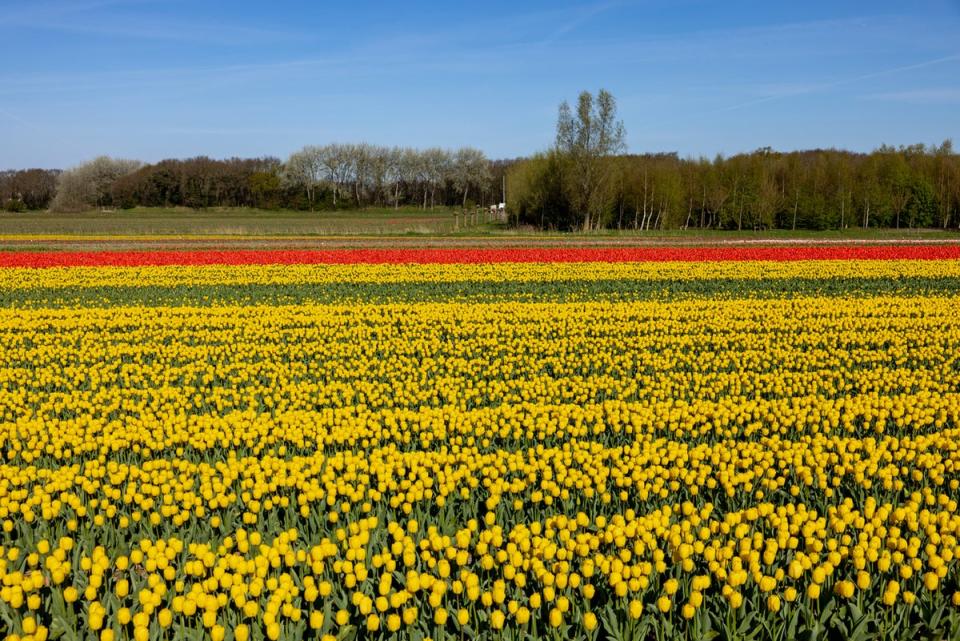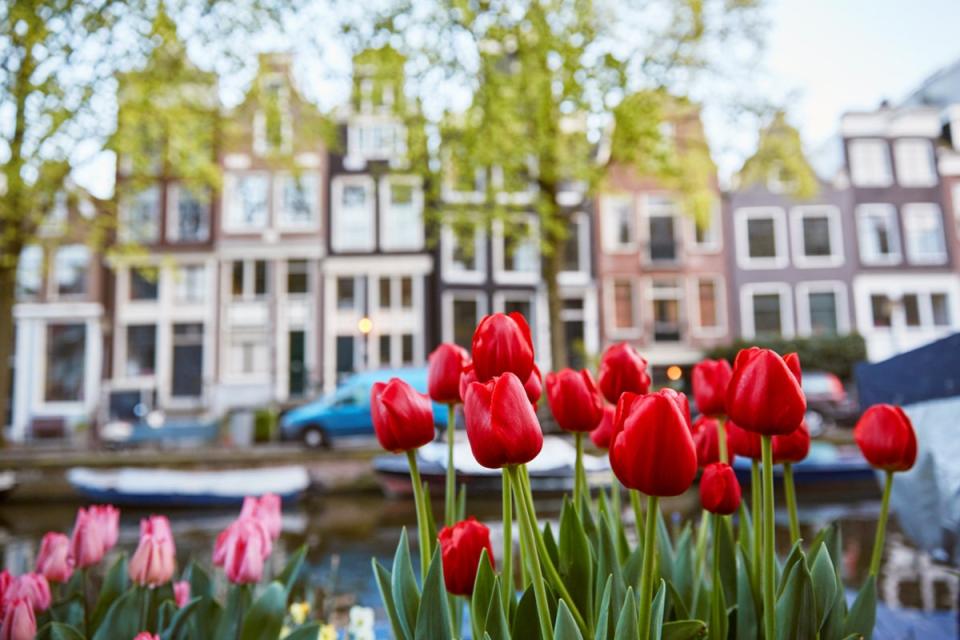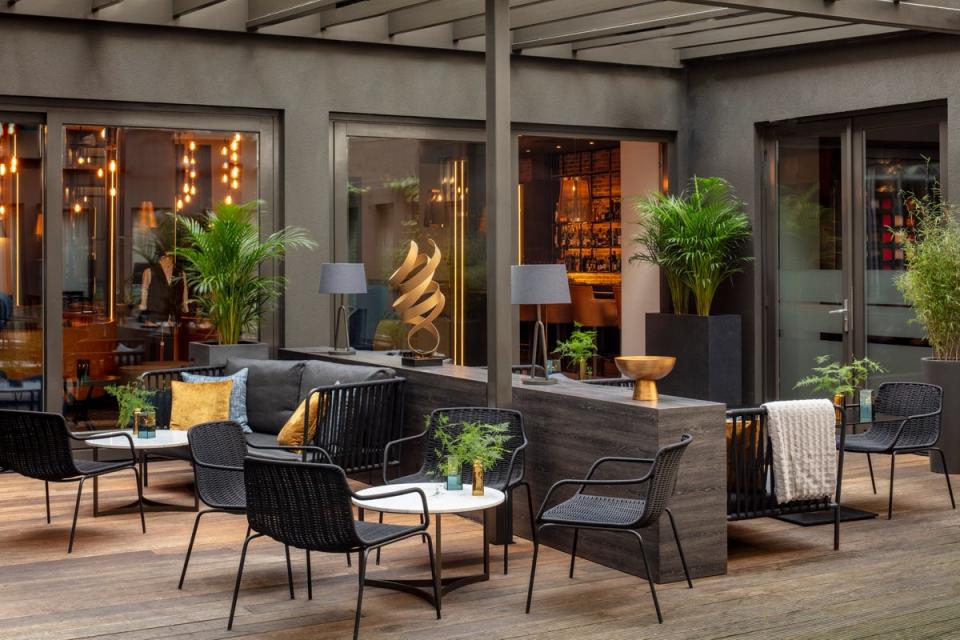Amsterdam in tulip season is short and sweet – but may be the most incredible time for a city break

There are peals of laughter behind me as I snap photos of a sea of colourful tulips in a field an hour’s drive outside Amsterdam city centre. I turn to see a elderly couple chuckling as a woman helps a man to stand in a pair of over-sized clogs. She takes a step back and he grins widely as she takes his picture before they swap places.
I am in Lisse at the Tulip Experience Amsterdam, a show garden with more than one million tulips. Despite the somewhat changeable weather, it seems there is something about these bright blooms that makes everyone feel cheerful.
Around me, groups take the opportunity between spring showers to head out into the show gardens to take Instagram-worthy selfies among long, neat rows of tulips interspersed with quintessentially Dutch icons such as those clogs, bikes and a windmill.
The hangar which houses the attraction’s museum and exhibition is packed with visitors – it is the busiest day of the year so far and the tulip season lasts a matter of weeks – but outside feels spacious, with room for everyone to enjoy the Netherlands’ famous flower.

Read more on Europe travel:
The best spas in Eastern Europe for an affordable – yet luxurious – break
The most incredible hotels in Paris: From Eiffel Tower views to luxury locations
But as I soon find out, while Max Bygraves may have sung of Tulips from Amsterdam, the tulips are from Kazakhstan and arrived here in the 16th century via what is now present-day Turkey.
And the name? Well, flowers were once worn by Ottoman sultans in tulip-shaped turbans as a sign of status and wealth and the word is derived from “tulipan”, once a word for “turban”.
These nuggets of information are provided by Sylvia, a third generation member of the Pennings family. Her grandfather started a tulip bulb business in 1951.
In a short tour of the museum, she tells our group the experience was established by her father, Simon, five years ago, partly in response to concerns that bulb fields were being damaged by visitors keen to take photographs of themselves among the flowers.
Sylvia is an enthusiastic guide as she tells us of the bulb’s history and how it is cultivated. Naming tulips after celebrities or well-known products is common – apparently it is easier to sell a tulip with a popular name.

There are varieties named Paul McCartney, Bob Marley and Donald Duck. Later, as I sit sipping champagne, enjoying a picnic lunch in a peaceful setting overlooking fields of red tulips, I wonder out loud if there is a Dua TuLipa. If not, someone has missed a trick.
Tulips are ubiquitous in Amsterdam, no more so than in the springtime, and over the course of two days I experience them in all their forms – bulb, flower, as food and drink and even skincare.
Back at my hotel – the Anantara Grand Hotel Krasnapolsky – I enjoy a delicious cocktail containing tulip-infused vodka, Aperol and elderflower in the luxurious surroundings of Bar The Tailor. The bar is named in tribute to the hotel’s original owner, Adolf Wilhelm Krasnapolsky, a tailor who opened a coffeehouse more than 150 years ago and which evolved into the hotel.
His influence is seen throughout the bar – the flooring sports a tailor’s marks, the light fittings resemble thimbles, the bar staff are known as “tailors” and an over-sized pair of scissors hangs from a wall. It is a cosy place to sit and recharge, with a themed cocktail menu that changes regularly. At the moment, the concept is “mythical creatures” with offerings such as the whisky-based “centaur” and tequila-focused “griffin”.
This is a different Amsterdam to the one I last visited 20 years ago. It may be the places I go, but there are less stag dos and large groups of inebriated people than I remember.
Instead, the city – which celebrates its 750th anniversary next year – feels vibrant and inviting, and not just for the tulips which adorn every street corner.

One afternoon I take a guided walk through the city’s three main canals – Herengracht (Gentleman’s canal) the most elegant of the trio, Keizersgracht (Emperor’s canal) and Prinsengracht (Prince’s canal) – and into the Jordaan area. This district, our guide Thijs says, is popular with locals. It was originally a poor part of the city, but now it is known for its architecture, good restaurants and shops.
As I walk, I sample some of Amsterdam’s best culinary offerings – starting with herring. Across the city, there are small huts selling Dutch herring. Served with chopped raw onion and pickled cucumber slices, it is filleted just moments before it is served.
As the weather turns cold, our group stops at a little chocolate shop for coffee and stroopwafel – two layers of thin baked waffle held together by a caramel. The sugar hit carries me on until we reach one of Amsterdam’s brown bars or cafes, so-called due to their age and traditional interiors.
Here I stop to enjoy another Dutch treat: apple pie. The flaky pastry, surrounding layers of crunchy apple, is immensely satisfying and gives me a feeling of contentment.
Thijs nods wisely. This feeling is what the Dutch call gezellig – meaning pleasant – and I happily agree as I eye up the leftover pie on the table.
How to do it
Stay at Anantara Grand Hotel Krasnapolsky Amsterdam, “one of the ‘grande dame’ hotels of Amsterdam continues to impress more than 150 years since opening”, says Benjamin Parker, The Independent’s deputy travel editor.
“It doesn’t get much more central than this spot on Dam Square, a traditional facade instantly gives way to a sleek, contemporary design on entry, and there’s an all-singing gastronomic experience – with a space worth eating each meal in.”
The Tulips in Bloom experience (four to six hours) costs €599/£512 for two; only available in the spring.
Read more: The ultimate guide to Amsterdam – the best things to do and where to stay

 Yahoo News
Yahoo News 
